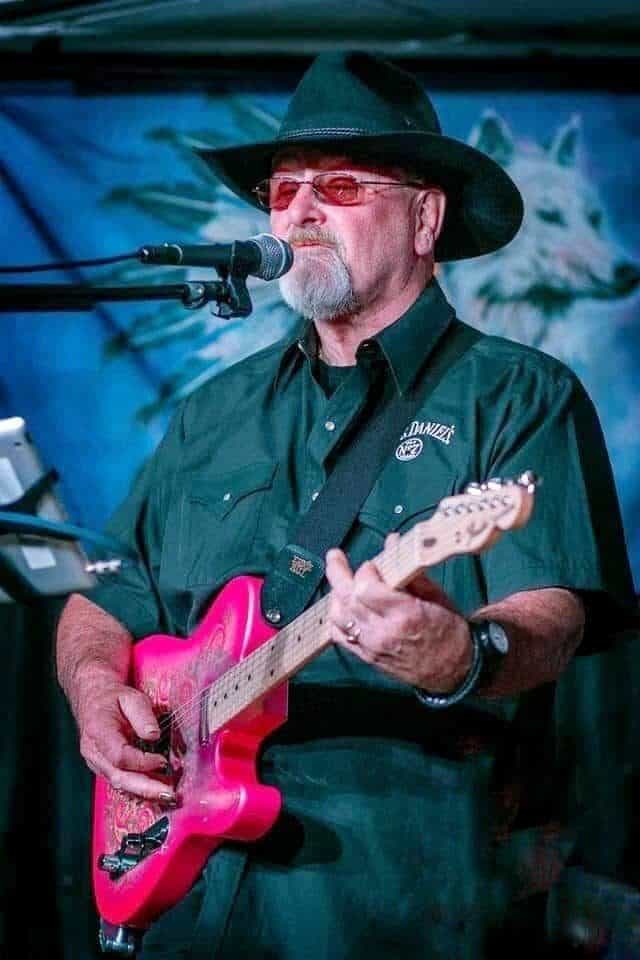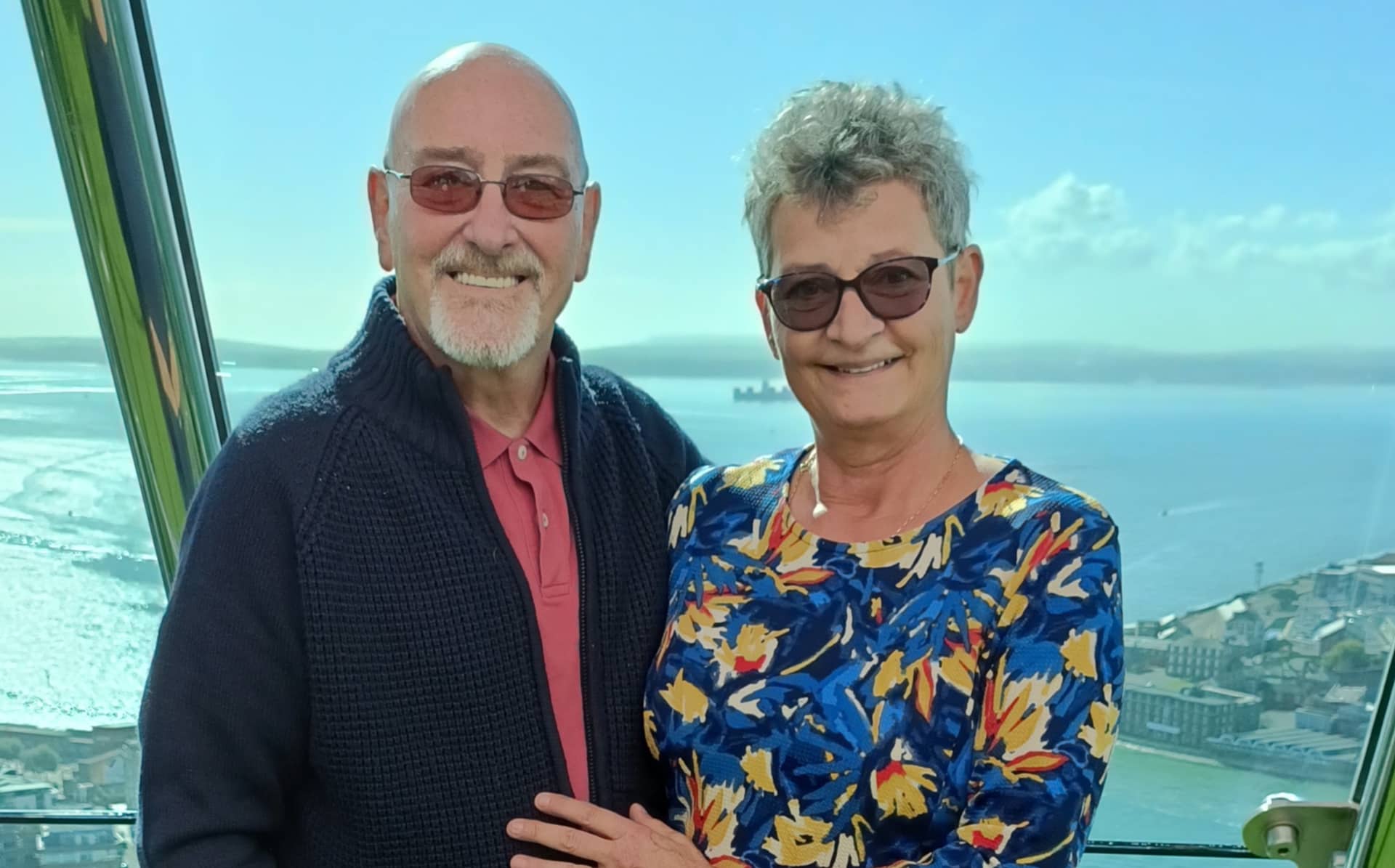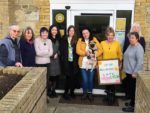An Isle of Wight stroke survivor fears budget cuts which could see the Island’s stroke support service axed, would be devastating for those who need it after leaving hospital.
Musician Chris Messer and his wife are among more than 3,000 people who have been supported by the Stroke Association’s service, which is funded by the Isle of Wight Council.
Reduction in funding
However, budget cuts being discussed by the council’s Cabinet on Thursday 9th February could see the charity’s funding reduced or even withdrawn completely.
This is despite the number of people living with the lasting effects of stroke on the Island, with its aging population, being 50 per cent higher than the national average.
Chris’s story
Chris, 70, said support from the Stroke Association was invaluable to both him and to his wife Joeley as he struggled to rebuild his life after stroke.
He was at home in Ryde when he had his stroke during the lockdown in 2020.
Chris said,
“I was recording an album at home, making a cup of tea for Joeley and suddenly the world started going weird.
“I felt very strange, disoriented, and after calling upstairs I threw one of the mugs of tea at the wall to get her attention. That’s all I remember. After that it was all ambulance crews and hospital.”
Chris, who now lives in Winford, praised the treatment at St Mary’s Hospital in Newport, but says once he was allowed home he and his wife would have had difficulty coping without the support they received from the Stroke Association.
Messer: I had no capacity to work anything out
Chris said,
“Mentally and emotionally the aftermath of a stroke is that you haven’t got the capacity to care or know where you want to go.
“I had no capacity to work anything out and Joeley, who was trying to research stuff, was at her wits end.
“I was in a room with no windows and Vikki and Heidi from the Stroke Association provided the switch for the light. Out of the blue, someone came helping me, to inspire me to do something, to read books or do things I’d forgotten about. They sorted out the well-being things.”
Practical help
The charity’s stroke support coordinators were able to help Chris and Joeley with information on his fatigue and headaches after stroke, his diabetes, problems with memory and thinking, as well as practical things such as driving after a stroke and where to go for help with benefits and financial assistance.
Lifelong musician forgotten how to play
Chris, whose mother-in-law Barbara died after a stroke, had been a professional musician for many years, playing everything from country to rock, but found to his horror that he couldn’t remember how to play the guitar.
“After the stroke I had totally forgotten how to play… everything, scales, chords, I couldn’t remember any of it. I knew what a guitar was but couldn’t remember how to play it. The Stroke Association and my wife encouraged me to learn everything again.
“They also introduced me to the stroke group. At first, during the pandemic, it was on the phone and Zoom, but it helped me get back into a community.
“My brain capacity at that point was very limited. It gave me an incentive to do something.”
“If the Stroke Association support service is cut, I would say ‘Don’t have a stroke on the Isle of Wight because you’ll get no support. You’ll have nowhere to go’. It would be devastating.
“You have a massive stroke, you go through the hospital, have a bit of physiotherapy and then you’re released and you’re lost. You don’t know what the next step is without the Stroke Association. When the Stroke Association came on the scene that was a real help.”

A lifeline for people with no knowledge of what to do
Joeley, 63, said,
“The Stroke Association is a lifeline for people with no knowledge of what to do.
“It can give the comfort, help, advice and support that you are not alone, which as a wife or partner is a very big thing when life is turned upside down.”
Messer: You have to get on with it
Two years on, Chris again mastered the guitar and is looking forward to performing again later this year.
“Because of the stroke it feels like the right-hand side of my face has dropped down, but it hasn’t.
“I get my words mixed up sometimes. Sometimes I lose balance, suddenly my hand doesn’t work.
“I look on it as an adventure – you have to get on with it.”
£70k funding from the IWC
Almost 4,000 people living on the Isle of Wight are recorded by their GPs as having had a stroke.
Jacqui Cuthbert, the charity’s associate director for the South West and Channel Islands, said the service, which is made possible by the £70,000 funding from the council, is a vital lifeline for stroke survivors as they struggle to cope after leaving hospital.
Jacqui said,
“Every stroke survivor treated by St Mary’s Hospital is currently referred to the service and every single one is offered support. Last year, this was more than 300 people.
“Our support coordinators help stroke survivors to live their best possible life after stroke, working with them to set and support their recovery goals, and make sure they don’t face the future alone.”
“This vital service also saves money in the long term, by reducing delays in discharge from hospital, better care planning, reducing unplanned hospital readmissions, and reducing the need for community-based health and social care services.
“We understand the financial pressures that the council is facing but the service is cost-effective and is simply invaluable for the hundreds of stroke survivors and carers we support every year.”
News shared by Martin Oxley on behalf of The Stroke Association. Ed





